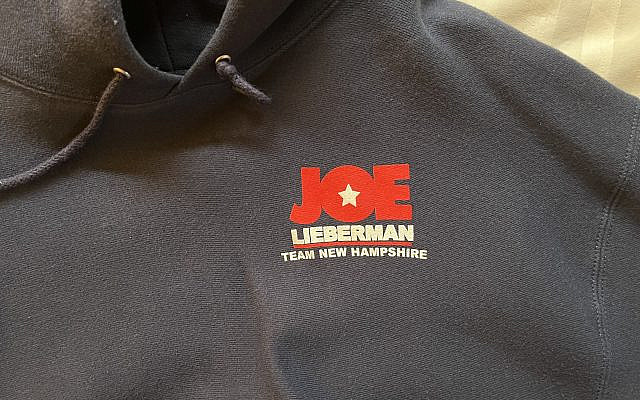Good for the Jews: Joe Lieberman, z”l
When Joe Lieberman ran for president in 2004, I felt like I was walking around with a lottery ticket in my pocket. I could more than imagine; I began to anticipate good things happening for my family, for people I cared about, for people in the United States and the world whom I didn’t know and would never know. Also like walking around with a lottery ticket in my pocket and dreams of a bright future lightening my step, I knew the odds of Joe Lieberman’s winning national office were long, but winning was possible. As I heard him say, “I did it before.”
And so, in January 2004, I drove up to volunteer in Joe Lieberman’s New Hampshire Primary HQ in Manchester, where I was graciously hosted by a family who not only supported him, but, like a magnet, drew people close to meet him.
Once people met him, they stuck by him. Early one morning, I was tasked to go into one of those diners filled with characters straight out of central casting calling for New Hampshire Primary Voters and to let them know that Joe Lieberman was coming. It was a thing he called “A Cup of Joe with Joe.” These are the voters who not only expect the candidates to schmooze with them (yes, even in NH they know what this means), they will hold it against them if they don’t.
I went to each booth wishing everyone a “Good Morning,” and telling them that in a few minutes Joe Lieberman would be coming. One guy looked me in the eye and said, “Well, you can tell Joe to just keep on walking because I’m not interested in talking to him.” Joe’s advance team came in a few minutes later, and I went to the head of the team to point out the guy who said he didn’t want to talk to Joe. The team leader said nothing. I said “Don’t you want to tell the senator?” He said “Just watch.” Joe made his way through the diner and came to the man who did not want to talk to him. Joe, of course, did not know that and engaged him like everyone else. In less than a minute they sat together, shared some coffee, some laughs, and good conversation. That was a profound lesson in so many things, but essentially in being true to who you are and having the confidence and the courage to share that with anybody, no matter who they are.
Later that week I went with the team to work a parlor meeting in the home of a donor, and as Joe engaged with the voters in the living room, I was talking with his speechwriter in the kitchen. He was sharing some ideas that the campaign was thinking about. Apparently, Joe did not want to send people to Mars (I did); he wanted a “Marshall Plan” to rebuild Iraq (I did not). I felt like I was on The West Wing and sparring with Sam.
There was a lesson here, too. In life, love, and in politics, we want someone who is compatible, but we are never going to find someone who is exactly like us, who agrees with everything we think and supports everything we do. Nor should we. We are looking for someone who cares about us and will care for us, someone we trust, someone with a true moral compass who has shown us that s/he will think deeply and carefully, someone who is not afraid to draw upon their feelings and their intelligence to arrive at an ethical conclusion; someone who is strong enough to change course because their curiosity and integrity led them there.
I knew Joe Lieberman to say hello, surrounded by some small talk, not really much more than that. But what I sensed in him was a kinship, someone who is drawn to and animated by an evolving relationship with God, Torah, America, and Israel; all of those things seemed to be integral to him, strands within oneself that may tug against one another from time to time, but are inseparable. If a “three-fold cord is not easily broken,” as Kohelet teaches, then a four-fold one is stronger still.
Joe Lieberman was not only a rare and special person, his 2000 campaign for vice president, and later for president, was a time when it was not only politically incorrect to be antisemitic, it was just plain uncool. That sense of Jewish pride and acceptance was personified by Joe Lieberman’s public example; in fact, the way he carried himself as a Jew and as an American helped to generate that brief period of philosemitism in our society.
May Joe Lieberman’s memory be a blessing for his family, for our Jewish people and for America. Let me leave you with the words he said to me at the end of my week in New Hampshire on a Friday morning as he and Hadassah got into a big beautiful bus that said “Lieberman for President” on its side:
“Good Shabbos!”




